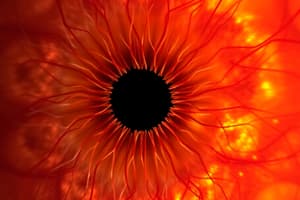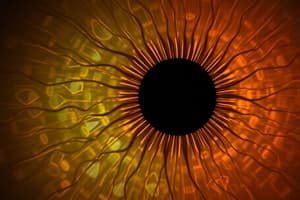Podcast
Questions and Answers
What is the term used to describe the sensitivity of the eye to different wavelengths of light?
What is the term used to describe the sensitivity of the eye to different wavelengths of light?
- Scotopic sensitivity
- Luminance sensitivity
- Spectral sensitivity (correct)
- Photopic sensitivity
Under what type of light levels do cones operate?
Under what type of light levels do cones operate?
- Mesopic light levels
- Dark adapted conditions
- Photopic light levels (correct)
- Scotopic light levels
What is the term for the luminance level under which rods operate?
What is the term for the luminance level under which rods operate?
- Scotopic (correct)
- Isopic
- Photopic
- Mesopic
What is the peak sensitivity wavelength for rods?
What is the peak sensitivity wavelength for rods?
How is the Vλ curve derived?
How is the Vλ curve derived?
What is the measurement conducted using logarithmic scaling for rods?
What is the measurement conducted using logarithmic scaling for rods?
What is the primary difference between cone and rod function in dark adaptation?
What is the primary difference between cone and rod function in dark adaptation?
At what point in the dark adaptation process does the stimulus appear colorless?
At what point in the dark adaptation process does the stimulus appear colorless?
What is the highest rod density in the visual field according to the text?
What is the highest rod density in the visual field according to the text?
How many quanta were absorbed by the rod photopigments at absolute threshold in the study?
How many quanta were absorbed by the rod photopigments at absolute threshold in the study?
What is the term for the smallest amount of energy which must be added to a stimulus in order to detect a change in the stimulus?
What is the term for the smallest amount of energy which must be added to a stimulus in order to detect a change in the stimulus?
What is the essential part of the tvi curve in photopic vision?
What is the essential part of the tvi curve in photopic vision?
Which law defines the relationship between the just noticeable difference and the intensity of the stimulus?
Which law defines the relationship between the just noticeable difference and the intensity of the stimulus?
What does Ricco's law describe in relation to visual perception?
What does Ricco's law describe in relation to visual perception?
What is the term for the background luminance on which a small spot of light is flashed for measurement of the increment threshold?
What is the term for the background luminance on which a small spot of light is flashed for measurement of the increment threshold?
What is the relationship described by Weber's law?
What is the relationship described by Weber's law?
What does Ricco's law state about the jnd threshold, ΔL, in relation to the area of the stimulus?
What does Ricco's law state about the jnd threshold, ΔL, in relation to the area of the stimulus?
What does Ricco's area represent in the neural representation of the visual system?
What does Ricco's area represent in the neural representation of the visual system?
What is the purpose of static perimetry in clinical use of increment thresholds?
What is the purpose of static perimetry in clinical use of increment thresholds?
What is plotted against the log of the spot area in Ricco's area representation?
What is plotted against the log of the spot area in Ricco's area representation?
Flashcards are hidden until you start studying
Study Notes
Dark Adaptation and Absolute Threshold in Vision
- The dark adaptation process involves two distinct parts, representing cone and rod function.
- Cones recover sensitivity first, followed by rods after about 8-10 minutes, with peak rod sensitivity occurring after 30-35 minutes in the dark.
- As cones recover sensitivity first, the target stimulus appears violet; as rod sensitivity improves, the stimulus becomes colorless.
- The dark adaptation curve varies depending on the individual's thresholds and the eccentricity in the visual field.
- In clinical applications, knowledge of dark adaptation function can help diagnose and treat patients with night blindness and hereditary vision disorders.
- The absolute threshold of scotopic vision is the lowest light energy level of a stimulus that can be perceived.
- Cone density is highest centrally and reduces into the periphery, while rod density peaks at about 20° in the periphery.
- The observer was dark adapted for 30-40 minutes and fixated on a small red spot while a stimulus was presented at 20° in the temporal retinal periphery to measure the absolute threshold.
- The energy from the light source at the plane of the eye was 2.1 x 10^17 to 5.7 x 10^17 joules, with 5-14 quanta absorbed by the rod photopigments at absolute threshold.
- A single quantum is sufficient to activate a rod, but a single activated rod is not sufficient for seeing due to the pooling of rod signals onto ganglion cells, which allows for high sensitivity but poor spatial resolution.
- The combination of signals from multiple rods onto a ganglion cell is called 'pooling', enabling the scotopic rod system to have high sensitivity to detect light but lesser ability to discern individual lights.
- The study aimed to measure the absolute threshold and understand the minimum number of neural impulses required for vision, shedding light on the functioning of the eye in low-light conditions.
Studying That Suits You
Use AI to generate personalized quizzes and flashcards to suit your learning preferences.




